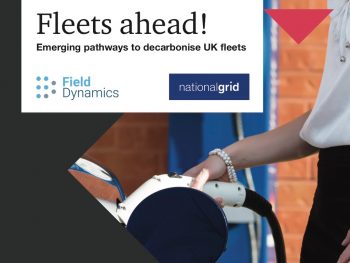Companies have up to three years to substantially transition their commercial fleet operations to low-carbon vehicles after which time they risk reputational damage in the wake of COP26 pledges.

A new report from PwC forecasts that the cost of commercial electric vehicles will be on an equal footing with their petrol and diesel counterparts by 2024, setting the point at which fleets should be ‘electric by default’ in the eyes of consumers who have already made the switch.
Around six million vehicles on the roads today are part of a commercial fleet, from delivery vans to buses and other specialist transport, and the ‘Fleets Ahead’ report, developed in partnership with Field Dynamics and National Grid, says that as more and more companies announce net zero pledges after COP26, decarbonising vehicle fleets is a critical component in achieving their goals. But it warns that many operators are not following a structured approach. And this is slowing down the decarbonisation process and sometimes causing unnecessary complications.
Matt Alabaster, PwC strategy & partner and co-author of the report, explained: “Electrifying your vehicle fleet is not just about buying the vehicles – it requires new thinking about energy procurement, about how to access the charging infrastructure needed, and about what skills and capabilities you need to manage and operate the fleet.”
But it’s not just fleets that need to take action, and PwC’s report also reveals that acceleration in capacity, choice and charging points is needed if the UK is to fulfil fleet decarbonisation pledges.
The report, which includes feedback from 40 players across the fleet industry, outlines a number of areas where action could be most effective.
This includes public charging provision; it suggests councils should be mandated by the Government to provide more publicly accessible charging points. A total of 66% of fleet interviewees stated councils have a critical role to play in enabling them to deliver on their net zero plans.
The report also calls for partnerships to accelerate the decarbonisation pathway – and suggests that emerging alliances such as the EV100 with OEMs could not only better inform of industry requirements but create opportunities to co-develop new vehicles.
Work is also needed to address EV choice and capacity – when it comes to electric vans, the vehicle offer is still two to three years behind electric cars, creating purchase difficulties for fleets that have to weigh up payload against range.
And the report urges work to tackle the difficulties in decarbonising heavy transport and says that, as with electric cars and vans, infrastructure, manufacturing capacity and range of vehicles available to the industry are key.
According to Adrian del Maestro, PwC strategy & director and also a co-author of the ‘Fleets Ahead’ report, both the UK and local government have a critical role to play as a catalyst for change in the roll-out of EV and hydrogen infrastructure, and as a positive influence in the commercial sector’s decarbonisation journey.
“While local councils have been identified as a major catalyst given their access to land, everyone recognises the financial constraints they face as well as the lack of technical specialism in charging.
“Ultimately they do not have statutory obligations to deploy charging solutions, a move that could be a game changer in accelerating EV adoption. This is where a clear UK government policy could act as a major catalyst for change, boosting investment and accelerating the provision of much needed infrastructure.
“The Government is already leading the way in accelerating adoption of EVs. It now has the opportunity to encourage local authorities to pioneer public charging solutions in association with the private sector. This will fast-track the EV revolution.”
To access the PwC report, click here.

